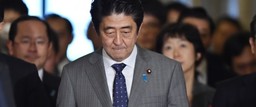 Source: Huffington.jp
Source: Huffington.jp On Monday, Chief Cabinet Secretary Suga made it clear that while Japan would join other nations in the international fight against terrorism, it would not be making any military contribution to the air campaign currently being waged against Islamic State, and neither would it countenance dispatching its Self Defence Forces to deal directly with IS. Instead, Japan would continue to give its support via non-military means, including the $200m in humanitarian aid that it had already pledged to those forces aligned against IS (J).
Nevertheless, the manner in which the hostage crisis was handled (also here – J and J), and subsequent opposition suspicions that PM Abe might use the pretext of ensuring the safety of Japanese citizens abroad as a reason to send the SDF overseas meant that security questions have dominated Japan’s political environment this week. For a nation that is still wrestling with the implications of constitutional re-interpretation on collective self-defence, the prospect of Japanese troops being sent to war zones to secure the safety of Japanese citizens is a bit too sudden, and there is a clear need to establish exactly what would meet the criteria for SDF involvement in overseas rescue operations.
Apart from the obvious need to have the consent of the country to which the SDF would be dispatched, there are questions as to whether this would then extend to military action. While the SDF might be able to act in response to natural disasters (as occurred in Christchurch in 2011, when SDF members were dispatched to assist in the search for survivors, among them Japanese citizens), the prospect of using military force to repel any threat to Japanese citizens abroad would be stretching constitutional interpretation to its limit, and bar any re-writing of the constitution (which is a slim possibility), it appears impossible to implement.
Yet despite this, one does feel for the family and colleagues of Goto, whose only purpose in being in Syria in the first place was to try to secure the rescue of Yukawa Haruna from the hands of IS. Really, IS may never have intended to free Yukawa or Goto in the first place, merely using them as another means of disseminating propaganda to disaffected Muslim youth and threatening developed states. Until we come to know the full facts behind IS’s motivations, this will all remain speculative. A good man died for no damned reason, and his memory should not be allowed to fade.
 RSS Feed
RSS Feed